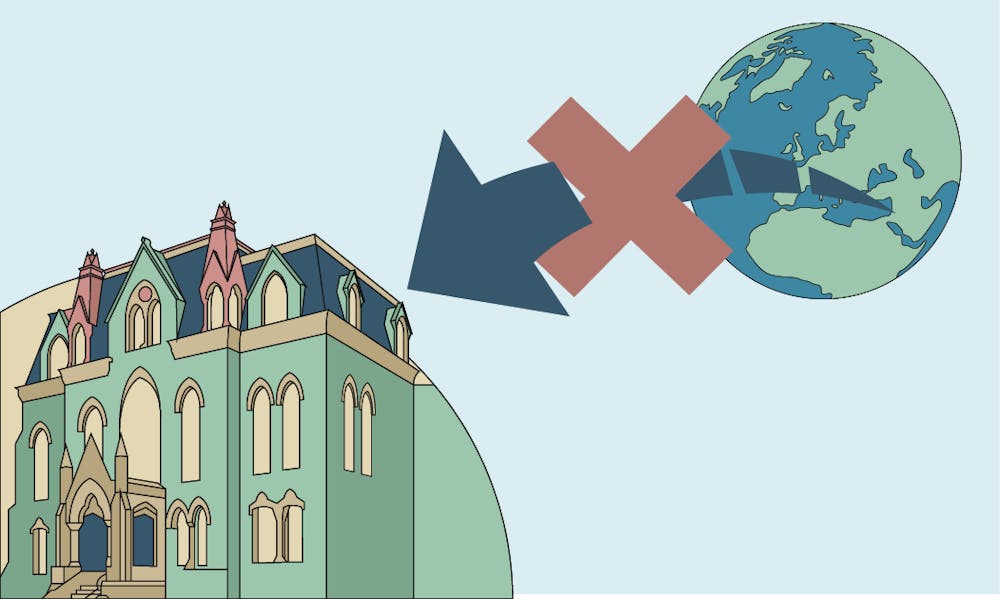A Penn student studying abroad in Israel has been required by the Israeli Ministry of Health to self-quarantine after a visit to Italy, which has been plagued by a recent coronavirus outbreak.
College junior Talia Rosenberg said she and approximately 40 other students studying abroad at Tel Aviv University traveled to Florence, Italy on Feb. 13 for a vacation and returned to Israel on Feb. 22. Rosenberg said Tel Aviv University and the Israeli Ministry of Health emailed the students five days after their return, instructing them to self-quarantine by isolating themselves in their residences.
Rosenberg said she and the other students began quarantining on Feb. 27 and expect the quarantine to end on March 8, approximately two weeks after their return from Italy.
On Feb. 27, the Israeli Ministry of Health required all people returning from Italy to self-quarantine for 14 days. Since then, Israel has mandated that people traveling from France, Germany, Switzerland, Spain, and Austria must also self-quarantine. Approximately 100,000 Israelis are currently in isolation, according to The Jerusalem Post.
Rosenberg said she has not left her apartment since the quarantine began approximately one week ago. Upon returning from Italy, Rosenberg said she read online that Israel may require people returning from Italy to self-quarantine, so she stocked up on groceries in preparation. She added that the Israeli government has provided quarantined students with 100 shekels, approximately $30, per day to order food.
Rosenberg described being in self-isolation for a week as "a weird kind of dystopian feeling."
Rosenberg added that her professors at Tel Aviv are aware of her situation and reassured her that the quarantine period will not affect her standing in class. She said that because most of the class material is online, she does not feel behind in any of her classes.

Rosenberg and other Tel Aviv University students who visited Italy have been quarantined since Feb. 27. (CC BY-SA 4.0)
RELATED:
Annenberg's FactCheck.org debunks several viral coronavirus conspiracy theories
The Wistar Institute joins global effort to create coronavirus vaccine
Rosenberg said Penn has not communicated with her aside from an email explaining that Tel Aviv contacted the University about her quarantine.
“It's just not 100% clear what's happening, but I think it's because everyone in the world is not really 100% clear on what's happening,” Rosenberg said. “It’s kind of hard for Penn to be taking the lead in that kind of a situation.”
Rosenberg said not all students quarantined at Tel Aviv are strictly following the self-quarantine guidelines. She said some students leave their isolation room to go out at night. According to the Israeli Ministry of Health website, home quarantine requires the person to stay indoors for the duration of the quarantine. Rosenberg added that failure to comply with the quarantine could result in up to seven years in prison, but she said she does not know of any arrests made yet.
Rosenberg said she and other students at Tel Aviv planned to visit Dublin for St. Patrick’s Day celebrations, but have since canceled their trip, fearing that they will not be let back into the country.
Since the spread of the virus, Penn has canceled University-sponsored travel to China, South Korea, Iran, and Italy. Provost Wendell Pritchett, Executive Vice President Craig Carnaroli, Vice Provost for Global Initiatives Ezekiel Emanuel, and Chief Wellness Officer Benoit Dubé also recommended that students and faculty avoid personal travel to these countries.
Penn has relocated two Global Research and Internship Program sites originally in China for this summer, and has barred students from studying in China this semester. The University has also recommended a 14-day self-isolation for all students returning from China.
The CDC has issued a level three warning for China, Iran, Italy, and South Korea and advises travelers to avoid nonessential travel to these countries.
Rosenberg said she does not know of anyone in the group of 40 students who returned from Italy with symptoms of the coronavirus. There have been 3,089 reported cases of coronavirus and 107 deaths in Italy as of March 4.
Rosenberg said she feels optimistic that she will remain at Tel Aviv University and complete her semester. She added that she feels comforted by the fact that Israel is relatively far from the recent coronavirus outbreak in Italy and that the Israeli government is taking precautions by restricting travel and requiring quarantine to prevent the spread of the disease.
“You talk about your junior year being the year you go abroad, and it's crazy that the one time you're abroad, there's this global pandemic,” Rosenberg said.









